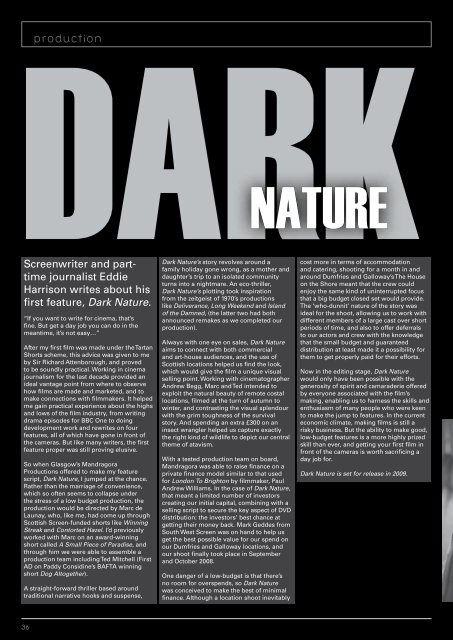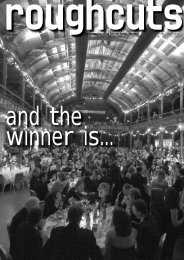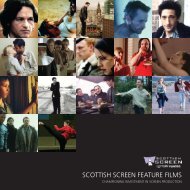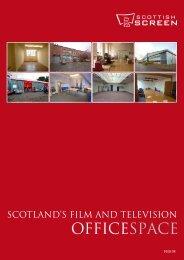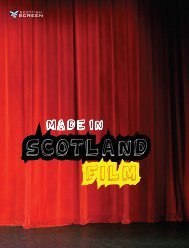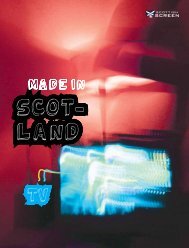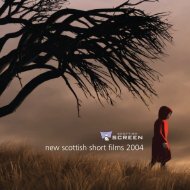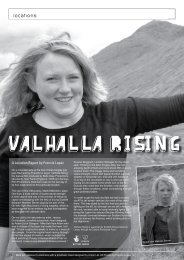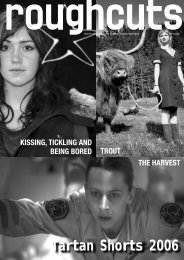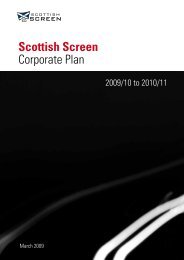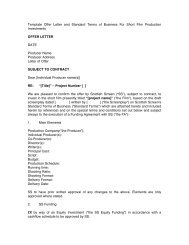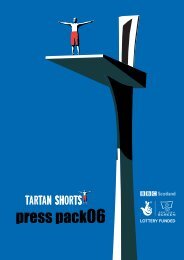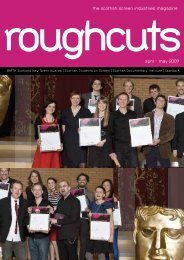Create successful ePaper yourself
Turn your PDF publications into a flip-book with our unique Google optimized e-Paper software.
production<br />
Dark Nature<br />
<strong>Screen</strong>writer and parttime<br />
journalist Eddie<br />
Harrison writes about his<br />
first feature, Dark Nature.<br />
“If you want to write for cinema, that’s<br />
fine. But get a day job you can do in the<br />
meantime, it’s not easy…”<br />
After my first film was made under the Tartan<br />
Shorts scheme, this advice was given to me<br />
by Sir Richard Attenborough, and proved<br />
to be soundly practical. Working in cinema<br />
journalism for the last decade provided an<br />
ideal vantage point from where to observe<br />
how films are made and marketed, and to<br />
make connections with filmmakers. It helped<br />
me gain practical experience about the highs<br />
and lows of the film industry, from writing<br />
drama episodes for BBC One to doing<br />
development work and rewrites on four<br />
features, all of which have gone in front of<br />
the cameras. But like many writers, the first<br />
feature proper was still proving elusive.<br />
So when Glasgow’s Mandragora<br />
Productions offered to make my feature<br />
script, Dark Nature, I jumped at the chance.<br />
Rather than the marriage of convenience,<br />
which so often seems to collapse under<br />
the stress of a low budget production, the<br />
production would be directed by Marc de<br />
Launay, who, like me, had come up through<br />
<strong>Scottish</strong> <strong>Screen</strong>-funded shorts like Winning<br />
Streak and Contorted Hazel. I’d previously<br />
worked with Marc on an award-winning<br />
short called A Small Piece of Paradise, and<br />
through him we were able to assemble a<br />
production team including Ted Mitchell (First<br />
AD on Paddy Considine’s BAFTA winning<br />
short Dog Altogether).<br />
A straight-forward thriller based around<br />
traditional narrative hooks and suspense,<br />
Dark Nature’s story revolves around a<br />
family holiday gone wrong, as a mother and<br />
daughter’s trip to an isolated community<br />
turns into a nightmare. An eco-thriller,<br />
Dark Nature’s plotting took inspiration<br />
from the zeitgeist of 1970’s productions<br />
like Deliverance, Long Weekend and Island<br />
of the Damned, (the latter two had both<br />
announced remakes as we completed our<br />
production).<br />
Always with one eye on sales, Dark Nature<br />
aims to connect with both commercial<br />
and art-house audiences, and the use of<br />
<strong>Scottish</strong> locations helped us find the look,<br />
which would give the film a unique visual<br />
selling point. Working with cinematographer<br />
Andrew Begg, Marc and Ted intended to<br />
exploit the natural beauty of remote costal<br />
locations, filmed at the turn of autumn to<br />
winter, and contrasting the visual splendour<br />
with the grim toughness of the survival<br />
story. And spending an extra £300 on an<br />
insect wrangler helped us capture exactly<br />
the right kind of wildlife to depict our central<br />
theme of atavism.<br />
With a tested production team on board,<br />
Mandragora was able to raise finance on a<br />
private finance model similar to that used<br />
for London To Brighton by filmmaker, Paul<br />
Andrew Williams. In the case of Dark Nature,<br />
that meant a limited number of investors<br />
creating our initial capital, combining with a<br />
selling script to secure the key aspect of DVD<br />
distribution: the investors’ best chance at<br />
getting their money back. Mark Geddes from<br />
South West <strong>Screen</strong> was on hand to help us<br />
get the best possible value for our spend on<br />
our Dumfries and Galloway locations, and<br />
our shoot finally took place in September<br />
and October 2008.<br />
One danger of a low-budget is that there’s<br />
no room for overspends, so Dark Nature<br />
was conceived to make the best of minimal<br />
finance. Although a location shoot inevitably<br />
cost more in terms of accommodation<br />
and catering, shooting for a month in and<br />
around Dumfries and Galloway’s The House<br />
on the Shore meant that the crew could<br />
enjoy the same kind of uninterrupted focus<br />
that a big budget closed set would provide.<br />
The ‘who-dunnit’ nature of the story was<br />
ideal for the shoot, allowing us to work with<br />
different members of a large cast over short<br />
periods of time, and also to offer deferrals<br />
to our actors and crew with the knowledge<br />
that the small budget and guaranteed<br />
distribution at least made it a possibility for<br />
them to get properly paid for their efforts.<br />
Now in the editing stage, Dark Nature<br />
would only have been possible with the<br />
generosity of spirit and camaraderie offered<br />
by everyone associated with the film’s<br />
making, enabling us to harness the skills and<br />
enthusiasm of many people who were keen<br />
to make the jump to features. In the current<br />
economic climate, making films is still a<br />
risky business. But the ability to make good,<br />
low-budget features is a more highly prized<br />
skill than ever, and getting your first film in<br />
front of the cameras is worth sacrificing a<br />
day job for.<br />
Dark Nature is set for release in 2009.<br />
36


